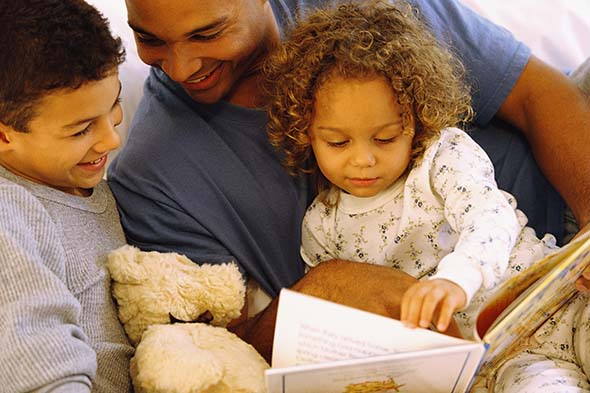
Tips for Building Your Child’s Vocabulary at Home

A robust vocabulary is key for academic success
Vocabulary development is a key component of school readiness and academic success. Kids use words to communicate their feelings and express themselves both orally, and eventually, on paper. In school, they are required to listen, process information, and read increasingly complex texts. A stronger vocabulary can help them thrive with these potential challenges. While some kids develop strong vocabularies simply through exposure to language, others benefit from more direct vocabulary-building exercises. Help your child develop a stronger vocabulary with the ideas detailed below.
Read Every Night!
Reading regularly to your child is one of the best ways to develop a stellar vocabulary. Books are language-rich and often filled with new words for your child to hear and absorb. Choose books that are age-appropriate and engaging for your child. As you encounter a word your child may not know, ask her if she knows its meaning. If so, have her articulate the definition in her own words. If not, define the word for her using basic terms and give relevant examples. For example, you might come across the lines: “The girl was very gracious to her mother. She helped her set the table and clean up after the guests left.” Ask your child if she knows what the word “gracious” means. If so, have her define it; if not, explain to her that it means kind and caring, and talk about times when your child may have acted graciously. Relating the new words to her life can help her process and remember them.
Play the “New Word” Game
Play a fun, vocab-building game by choosing (or having your child choose) a word of the day. Teach him the definition of this word in a clear and simple manner. Then provide an example of how the word can be used and ask him to do the same. For instance, your word of the day might be “gigantic,” which means something very, very big. You might tell him that an elephant is a gigantic animal, and have him come up with his own example of something gigantic, like a bear or mountain. Once the definition of the word is clear, turn it into a game by seeing how many times he can use that word correctly throughout the day. You can even track his new word usage using points on a chart, and offer a fun reward for reaching a certain number of points. To take it to another level, make it a family game by having a different family member come up with the word of the day–or perhaps word of the week. Track each person’s word usage, and the family member who correctly uses the word most frequently in that period of time wins.
Teach Prefixes and Suffixes
Teaching prefixes and suffixes can help children learn and understand hundreds of new words. Choose a prefix–pre, dis, non, for example–and have your child come up with as many words as she can think of containing that prefix (or suffix). Then discuss the definitions of each word and what those definitions have in common. For instance, you might focus on the prefix “pre.” Have her come up with as many words containing the prefix that she can think of, and jot them down on a whiteboard or sheet of paper. She may come up with words like predict, preview, and prevent. Then discuss the definitions with her: Predict means to say something will happen before it actually does, preview means to look at something before someone else, and prevent means to stop something from occurring before it does. What do all of these definitions have in common? They all have to do with something happening “before.” Alas, the definition of “pre” means “before.” It can be eye-opening to consider how many new words your child can learn with just a few prefixes and suffixes.
Play Vocab Games
Have fun building your child’s vocabulary by playing more traditional word games. Such games might include Boggle, where letters are scrambled and players have three minutes to come up with as many words as possible, or Scrabble, where players create words using letter tiles. Apples to Apples is another great vocabulary-building game, where players match specific verb and noun phrases to adjectives, building stronger grammar skills as an added bonus. Encourage your child to play these types of games with his friends, or play them together as a family. The key is to keep them engaging and fun.
Take a Walk!
Take a walk around the block with your child and play a vocabulary-building game. Ask her to think of all of the objects she sees that start with a specific letter. You can even alternate turns. For example, choose the letter “d.” She says the word “dog.” Then you say “door,” she says “duck,” you say “dent,” and so on. You can also play a similar game with words that rhyme. For instance, as you walk, ask her to come up with objects she sees that rhyme with hat, and alternate. She might say cat, then you say bat, she says flat, and so on. In playing these games, you will strengthen her vocabulary, phonemic awareness, and overall language skills.
A strong vocabulary is a key element of academic success. Try these techniques to help your child build a stronger, more robust vocabulary while having fun and enjoying the process.
